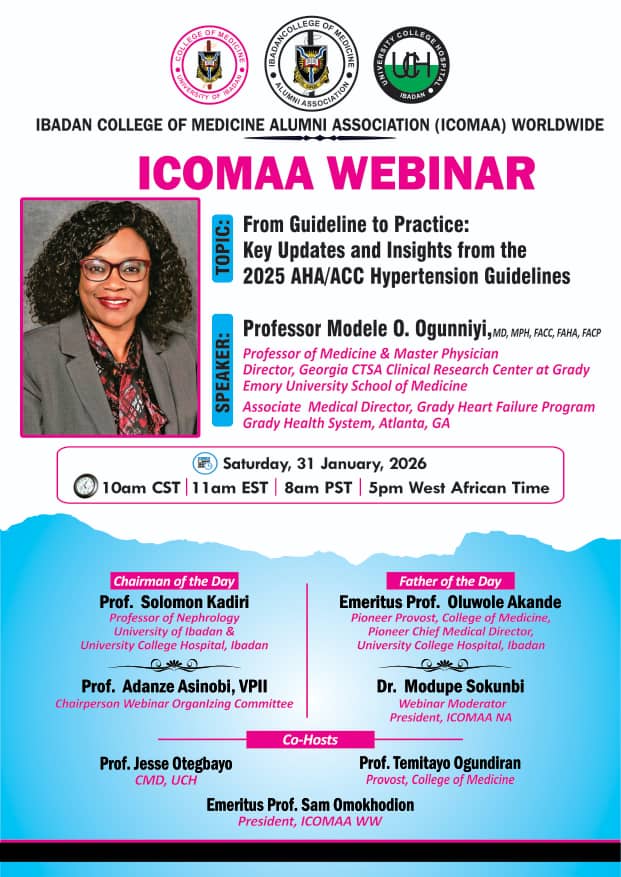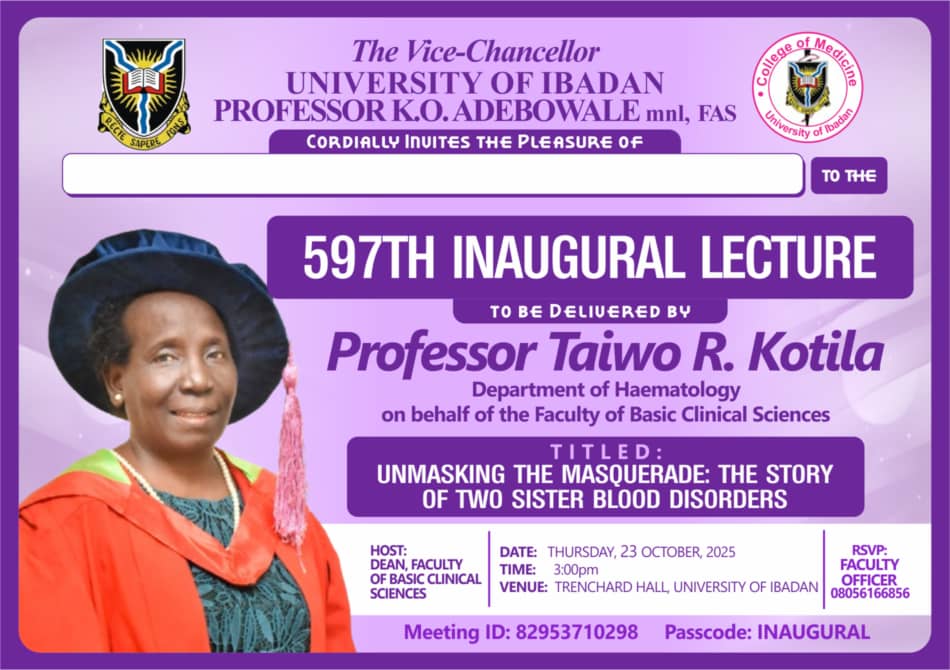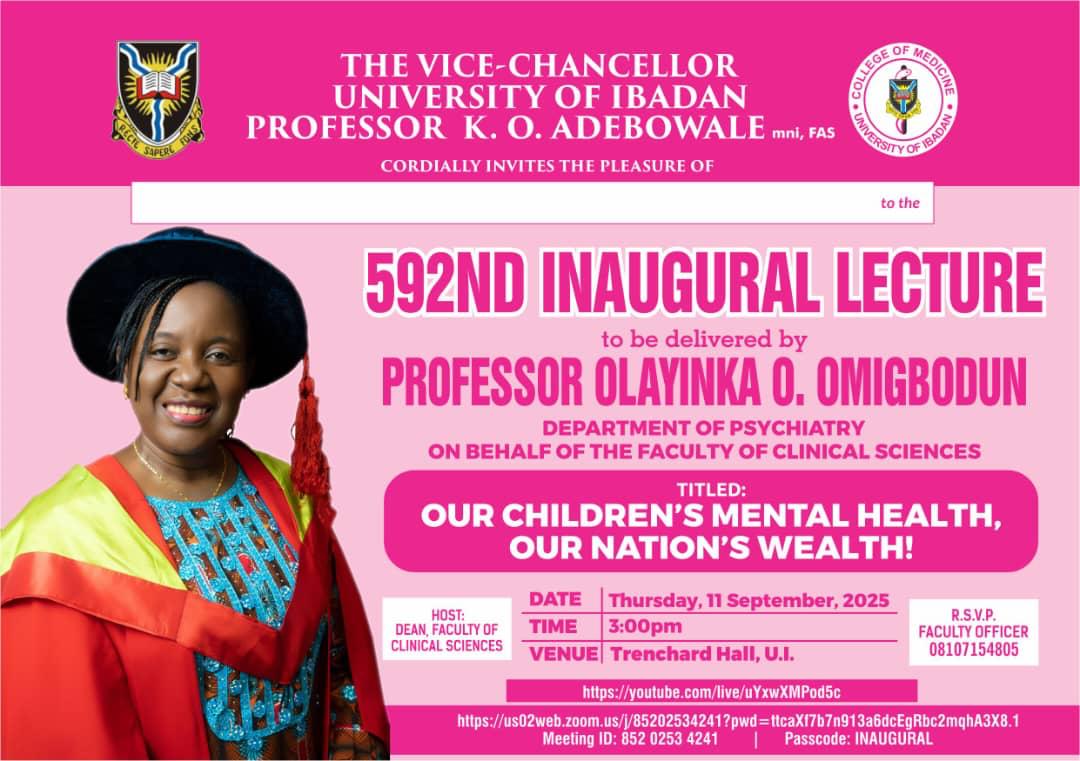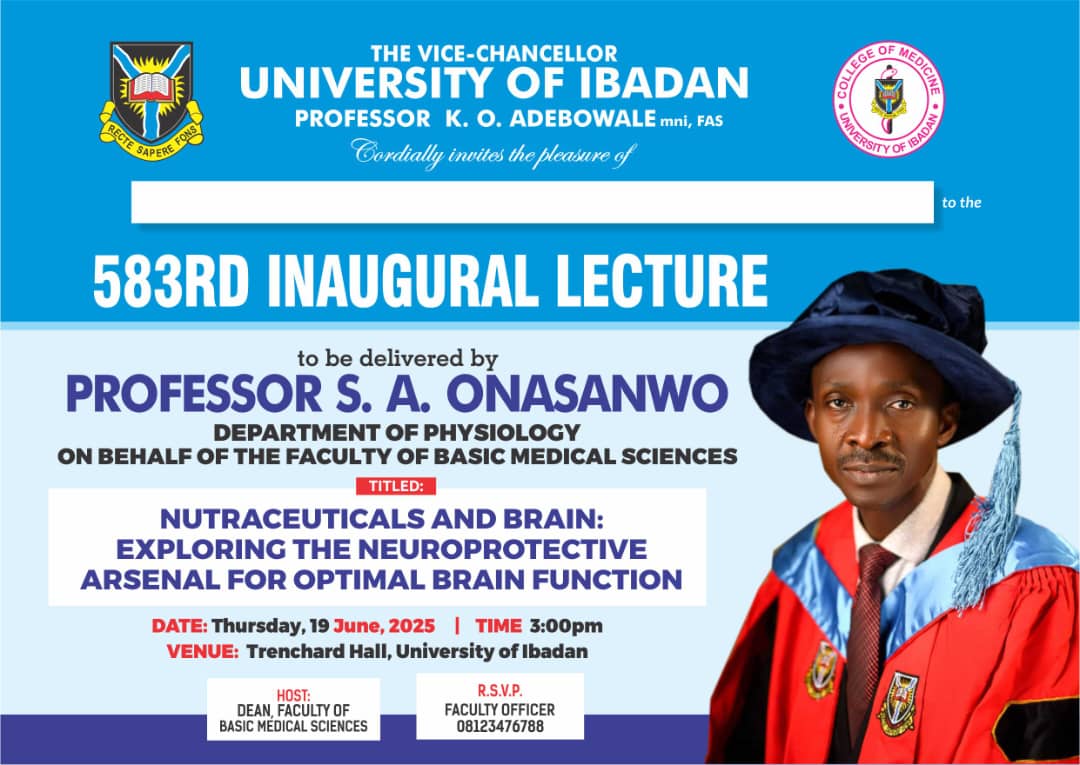TITLE: From Guideline to Practice: Key Updates and Insights from the 2025 AHA/ACC Hypertension Guidelines
DATE: Saturday, 31st January, 2026
TIME: 5:00 P.M. West Central Africa
TO BE DELIVERED BY: Professor Modele O. OGUNNIYI
YouTube Link
Join Zoom Meeting: CLICK HERE
Meeting ID: 875 3500 5975
Passcode: WEBINAR
Thank you
The Vice-Chancellor, Professor K.O. Adebowale, FAS, mni, cordially invites you to the 597th Inaugural Lecture, to be delivered by Professor Taiwo Kotila of the College of Medicine, University of Ibadan (CoMUI).
TITLE: UNMASKING THE MASQUERADE: THE STORY OF TWO SISTER BLOOD DISORDERS
DATE: THURSDAY, 23RD OCTOBER, 2025
TIME: 3:00 P.M. West Central Africa
VENUE: TRENCHARD HALL, UNIVERSITY OF IBADAN
TO BE DELIVERED BY: PROFESSOR TAIWO KOTILA
Thank you
Prof. Temidayo Ogundiran FAS
Provost
597TH INAUGURAL LECTURE, UNIVERSITY OF IBADAN, BY PROFESSOR TAIWO R. KOTILA

Professor Taiwo Rachel Kotila was born in Lagos, into the family of the late Major Michael Ayodele Kotila (rtd) and the late Mrs. Alice Abike Kotila. Both parents hailed from Ifaki-Ekiti, in Ido-Osi Local Government Area of Ekiti State.
She received her early education at Ibadan City Council (ICC) Practicing School, Oke-Bola, Ibadan. She then proceeded to the Methodist Girls’ High School, Ifaki-Ekiti between 1972-1977 for her secondary education. She had a stint at Olivet Baptist High School, Oyo for Advanced Level studies. Thereafter, she gained admission to the University of Ibadan and graduated MBBS in 1987. She started her residency training in Haematology at the University College Hospital, Ibadan in 1990 and completed it in 1997 thus becoming a fellow of the National Postgraduate Medical College of Nigeria.
She worked briefly at the Federal Medical Centre, Owo, as the pioneer Head of the Pathology Division and a Consultant Haematologist. She joined the staff of the Department of Haematology, University of Ibadan in 1998 as Lecturer 1 and was promoted to the rank of a Senior Lecturer in 2001, Reader in 2016 and Professor in 2019. Professor Kotila is an honorary consultant to the University College Hospital, Ibadan. She obtained a Master of Science degree in Clinical Trials from the London School of Hygiene and Tropical Medicine, University of London in 2016.
She was a visiting research fellow at the Department of Haematology, Hebrew University, Jerusalem, Israel in 2009 and 2010. It was during this time that she acquired expertise in the use of molecular methods in the diagnosis of the haemoglobinopathies. The visit was funded by a scholarship from the Royal Society for Tropical Medicine and Hygiene (RSTMH). She returned to Hadassah Hospital in Jerusalem, Israel in 2016 when she spent her sabbatical year in the Department for Bone Marrow Transplantation and Immunotherapy.
Professor Kotila has served the University in various capacities. She was twice the acting Head of the Department of Haematology in 2013 and 2021, and was the Sub-Dean, Undergraduate of the Faculty of Basic Medical Sciences between 1999 and 2002. She is the Dean, Faculty of Basic Clinical Sciences, University of Ibadan. She was and is still a member of various committees in the Department, Faculty, College of Medicine and the University. She has supervised and co-supervised and is still involved in the supervision of Fellows of National Postgraduate Medical College, the West African College of Physicians, PhD and Masters students within and outside her faculty and the country. She has served as external examiner to Olabisi Onabanjo University, Afe Babalola University and the University of Ilorin. She was a visiting scholar to the School of Medicine and Allied Health Sciences, University of the Gambia in 2022.
Professor Kotila received the Dr. Charles Majekodunmi Prize as the Best Part II FMCPath candidate in Haematology in 1997. She also, received the Young Investigators’ Award of the Nigerian Society for Haematology and Blood Transfusion (NSHBT) for the year 2000. She is a member of many professional associations, notably among which are College of Nigerian Pathologists where she was the chair of the Oyo State branch between 2019 and 2021. She was the Treasurer of the Nigerian Society for Haematology and Blood Transfusion (NSHBT) from 1999 to 2002. She was a member of the Diversity, Equity and Inclusion Committee of the International Society of Thrombosis and Haemostasis (ISTH) from 2019 to 2021. She was also a member of the Guidance and Guidelines (G&G) Committee of the ISTH between 2020 and 2022. She is currently the Director of the UCH Haemophilia Treatment Centre (HTC), an affiliate of the World Federation of Haemophilia (WFH).
Professor Taiwo Kotila is an astute clinician and avid researcher of international repute. She has over 70 publications in peer-reviewed journals. She is a recipient of many grants, including the Senate Research Grant, one of the first recipients of the University of Ibadan Research Foundation grant, a recipient of the Royal Society for Tropical Medicine (RSTMH) Centenary award, European Developing Countries Clinical Trials Partnership (EDCTP) Travel Fellowship, World Federation of Haemophilia (WFH) research support progamme.
Her research interest is in the haemoglobinopathies especially the characterization of beta thalassaemia which was thought to be of little clinical significance among Nigerians until now.
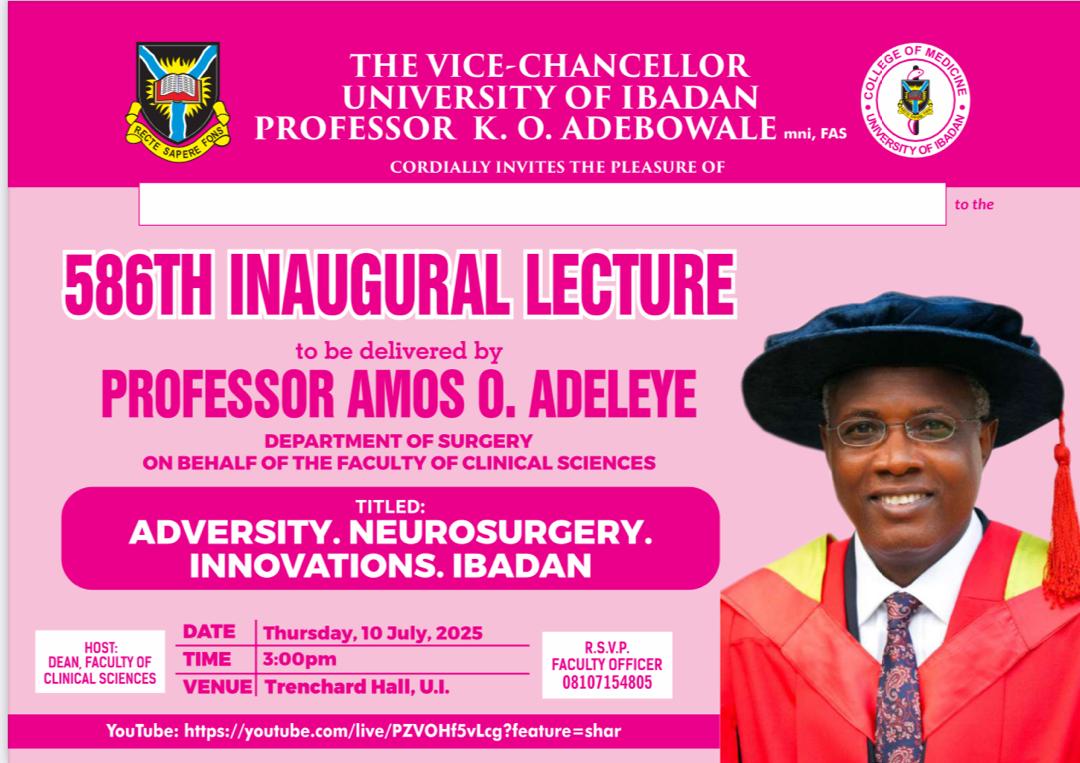
The Vice-Chancellor, Professor K.O. Adebowale, FAS, mni, cordially invites you to the 586th Inaugural Lecture, to be delivered by Professor Amos O. Adeleye of the College of Medicine, University of Ibadan (CoMUI).
TITLE: ADVERSITY. NEUROSUGERY. INNOVATIONS. IBADAN
DATE: THURSDAY, 10TH JULY, 2025
TIME: 3:00 P.M. West Central Africa
VENUE: TRENCHARD HALL, UNIVERSITY OF IBADAN
TO BE DELIVERED BY: PROFESSOR AMOS O. ADELEYE
Thank you
Prof. Temidayo Ogundiran FAS
Provost
586TH INAUGURAL LECTURE, UNIVERSITY OF IBADAN, BY PROFESSOR AMOS O. ADELEYE
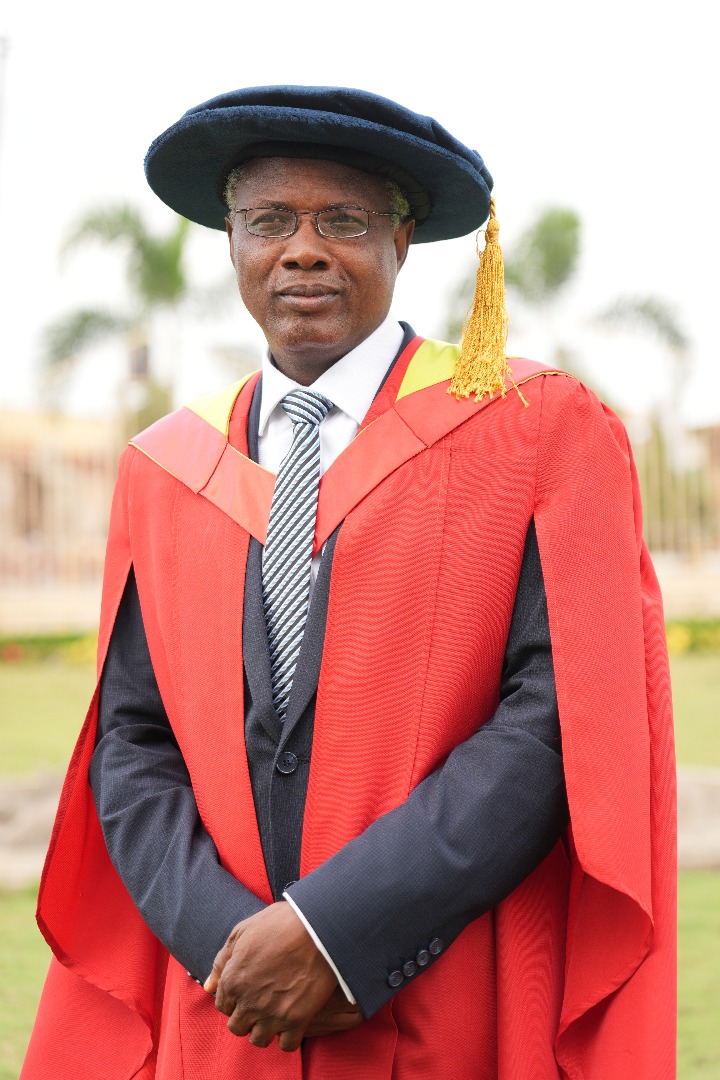 Modern-day practice of neurological surgery is expensive due to its dependence on cutting-edge technology in advanced centers of the West. In contrast, the practice in Nigeria, as in most developing countries, is still plagued by the well-known, peculiar systemic challenges of our resource-constrained socio-demographics. Nevertheless, we strive to practice this same rarefied field of medical /surgical science in our austere milieu with an irrepressible spirit that seeks to meet the global standard-of-care metrics.
Modern-day practice of neurological surgery is expensive due to its dependence on cutting-edge technology in advanced centers of the West. In contrast, the practice in Nigeria, as in most developing countries, is still plagued by the well-known, peculiar systemic challenges of our resource-constrained socio-demographics. Nevertheless, we strive to practice this same rarefied field of medical /surgical science in our austere milieu with an irrepressible spirit that seeks to meet the global standard-of-care metrics.
This Inaugural lecture, the 586th, is titled Adversity. Neurosurgery. Innovations. Ibadan. It proposes to showcase how we believe we are not wide of the mark in this pursuit.
Receiving his medical education here in the University of Ibadan, as well as his training in the surgical subspecialty of Neurosurgery in the University College Hospital, UCH, Ibadan, Professor Olufemi Adeleye, went further to observe a 2-year training in yet another subspecialty of Neurosurgery, which is Skull Base Surgery, for two years in Jerusalem, at Israel’s foremost center of medical education, the Hadassah-Hebrew University Medical Center, Department of Neurosurgery, Ein-Kerem Jerusalem. He also underwent several short stints at other prominent units in the West, Europe, and the United States of America, including Johns Hopkins University Hospital, Baltimore, Maryland, and Harvard Medical School, at the Children’s Hospital Boston, Massachusetts, USA. Returning home, to the University College Hospital (UCH), Ibadan, he began his academic neurosurgery journey as Lecturer I in the College of Medicine. He put a lot of the knowledge and skills acquired abroad to use, modified and adapted them to the local environment here, and often came up with innovative ways of delivering reasonably advanced care to his patients. This lecture features some instances of these innovations amid adversity here in Ibadan, Nigeria, in Neurosurgery.
In one instance, he converts the surgical treatment of compound depressed skull fracture from the usual multi-stage, at least double, to a single-stage surgical treatment. The same was done to the surgical treatment of compound complex frontal-orbital convexital skull fracture. Similarly, he treats well-selected cases of chronic subdural haematoma non-operatively; and when he chooses to operate, he innovated a much less disruptive surgical procedure, single frontal burr-hole craniostomy under local anaesthesia plus sedation, for the procedure.
Over time, he has devised other less-disruptive surgical procedures for certain neurosurgical conditions. One example is a nuanced practice of Awake Craniotomy in several patients, and this is in situations that pose fundamental logistic constraints. Another one is the use of an old neurosurgical technique of osteoplastic craniotomy to execute the procedure of hinged decompressive craniectomy, or hinged craniotomy, to try to surgically mitigate raised intracranial pressure.
Finally, this lecture also highlights the lecturer as the only known published academic neurosurgeon on the subject of non-shaved cranial surgery in all of the black-man's world.
In all, rigorously acquired clinical data are used to document the tolerable outcomes, some as good as those obtainable in much better-resourced units in the West, of many of the surgical innovations.
Invitation to the 592nd Inaugural Lecture of the University of Ibadan
The 592nd Inaugural Lecture of the University of Ibadan will be delivered by Professor Olayinka Olusola Omigbodun, FAS (CoMUI Alumna, MBBS Class of 1985), on behalf of the Faculty of Clinical Sciences in the College of Medicine, University of Ibadan.
The general public is invited to the 592nd Inaugural Lecture to be delivered by Professor Olayinka O. Omigbodun, FAS of the Department of Psychiatry, Faculty of Clinical Sciences, College of Medicine, University of Ibadan.
The details of the event are given below:
Theme: Our Children’s Mental Health, Our Nation’s Wealth!
Date: Thursday, 11 September 2025
Time: 3:00 p.m.
Venue: Trenchard Hall, University of Ibadan
You can also join virtually using the details below:
YouTube: Click here
Zoom: Click here
Meeting ID: 852 0253 4241
Passcode: INAUGURAL
Thank you.
BIODATA OF PROFESSOR OLAYINKA OLUSOLA OMIGBODUN FAS, FNAMed, FAMedS
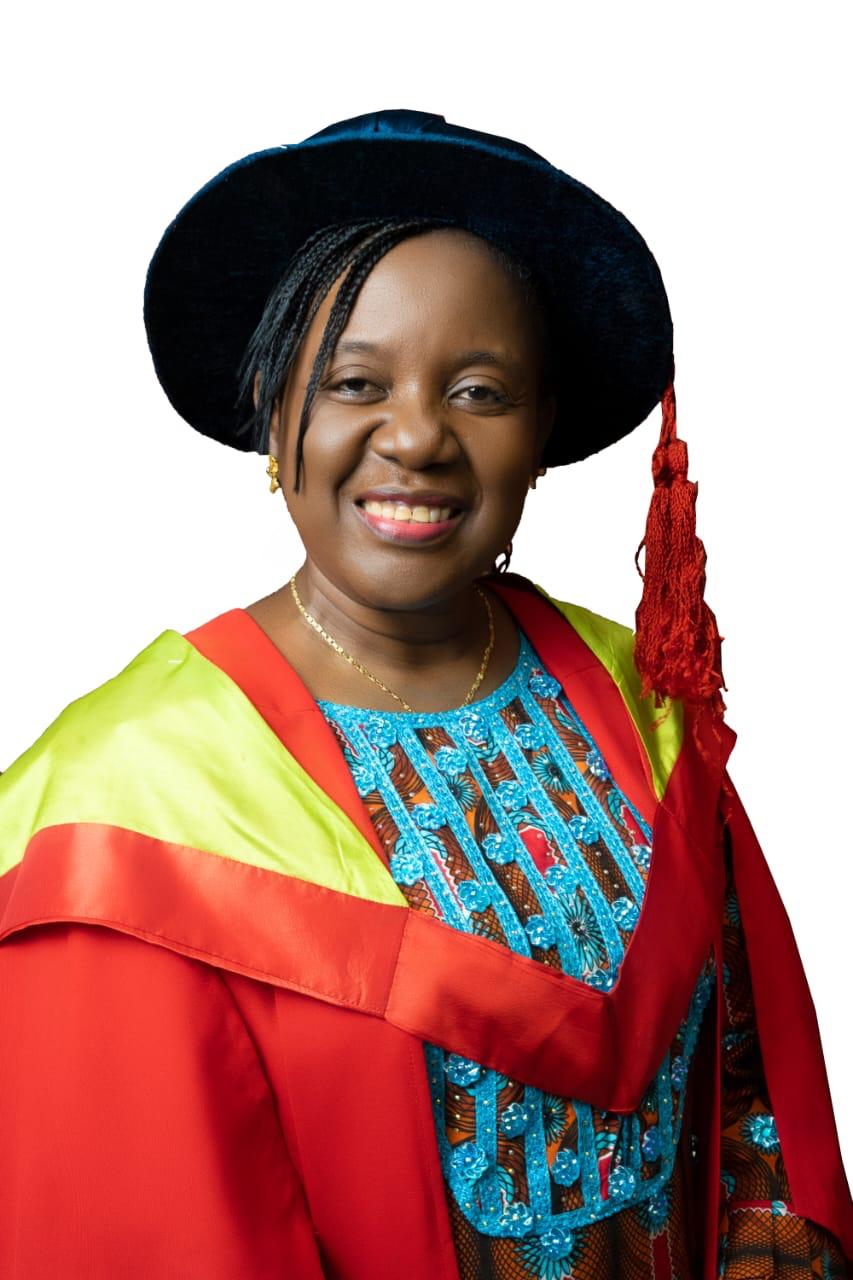 Professor Olayinka Olusola Omigbodun was born on 11 February 1963 at the University College Hospital, Ibadan, a place that would later become central to her entire academic and professional life. Her father was Lieutenant Colonel Victor Adebukunola Banjo, the Commanding Officer of the Apapa Infantry Division and the first Nigerian Director of the Electrical and Mechanical Engineering Corps of the Army. He hailed from Ijebu-Ode. Professor Omigbodun’s mother, Mrs Taiwo Joyce Banjo, née George, was a Creole from Kissy, Freetown, Sierra Leone; she was also a descendant of freed slaves, whose birth certificate records her ancestry as father’s race, Ijesa, and mother’s race, Igbo.
Professor Olayinka Olusola Omigbodun was born on 11 February 1963 at the University College Hospital, Ibadan, a place that would later become central to her entire academic and professional life. Her father was Lieutenant Colonel Victor Adebukunola Banjo, the Commanding Officer of the Apapa Infantry Division and the first Nigerian Director of the Electrical and Mechanical Engineering Corps of the Army. He hailed from Ijebu-Ode. Professor Omigbodun’s mother, Mrs Taiwo Joyce Banjo, née George, was a Creole from Kissy, Freetown, Sierra Leone; she was also a descendant of freed slaves, whose birth certificate records her ancestry as father’s race, Ijesa, and mother’s race, Igbo.
Professor Omigbodun started nursery education at Adrao International School, Victoria Island, Lagos, but the turbulence of the Nigerian Civil War and other difficult circumstances forced her mother to leave the country with her children and return to her homeland. Professor Omigbodun spent her early childhood outside Nigeria, attending Holy Rosary Primary School, Kenema, and St Anne’s Primary School in Freetown. When the family returned to Nigeria after the war, she completed her primary education at the Staff School, University of Ibadan, and entered St Louis Grammar School, Ibadan in 1973 for her secondary education. Professor Omigbodun excelled all round, as she was an athlete at school, winning the 100 metres final in her final year. She also represented the Ibadan/Ibarapa zone in the 200 metres women’s race at the Oyo State level. She also learnt how to play the piano and guitar. Apart from being a member of the school choir, she joined the University of Ibadan Music Circle (along with her music teacher, Sister Galgani) while she was in secondary school. In her final year, when she was Assistant Head Girl, she received the Character and Service Award, a prize awarded by the Ibadan Catholic Diocese to the most outstanding student in character and service. She moved to the International School, Ibadan for her Advanced Levels and from there she gained admission to study Medicine at the University of Ibadan in 1980. She graduated MBBS in 1985, winning the prize in Physiology.
Following her internship at the University College Hospital in 1986 and her National Youth Service Corps year, where she gained direct exposure to psychiatry, she chose psychiatry as her professional calling, with a particular interest in the child and adolescent mental health subspecialty. She began residency training in psychiatry at the University College Hospital, Ibadan in 1987. Between 1990 and 1992, she trained at the Lancaster Moor Hospital, Lancaster, and the Queen’s Park Hospital, Blackburn, in the United Kingdom. During her time in the United Kingdom, she was able to complete her dissertations, and, in 1991, she returned to Nigeria to sit for the final examinations of the National Postgraduate Medical College of Nigeria and the West African College of Physicians, obtaining the fellowship of both colleges. She also earned a Diploma in Psychiatry from the Victorian University of Manchester in 1992.
In 1993, she travelled to the United States of America with her family and trained in psychotherapy at the Department of Family Studies, University of Pennsylvania, Philadelphia. She was also a visiting scholar at the Bipolar Research Unit of the same institution from 1993 to 1996. She returned to Nigeria in January 1997 and was appointed Lecturer Grade One in the Department of Psychiatry in March 1997.
In 1998, she won the competitive British Chevening Scholarship and returned to the United Kingdom to study for a Master of Public Health (MPH) at the Nuffield Institute for Health, University of Leeds. She graduated in 1999 with a distinction, winning the John Griffiths Prize for outstanding performance. Her dissertation, Integrating Mental Health into Primary Health Care in Nigeria with Clearly Defined Roles for Psychiatric Hospitals: Developing a Pilot Project for Ibadan, obtained the award for the best dissertation of the year and was described by her examiners as the best in recent years. She returned to the University of Ibadan in 1999, combining teaching, research, and clinical work. In 2004, with support from the University of Ibadan’s MacArthur Foundation Staff Development Programme, she undertook further training in Child and Adolescent Psychiatry at the Greenwood Institute for Child Health, University of Leicester, United Kingdom.
In 1999, she established a clinic dedicated to children and adolescents with mental health concerns at the University College Hospital, Ibadan. From one clinic, this service expanded into three specialised clinics, a day care centre, an in-patient ward, and liaison services to other departments. This evolved into the Child and Adolescent Psychiatric Unit and later into the Department of Child and Adolescent Psychiatry, the first of its kind in any teaching hospital in Nigeria. As the pioneer head of department, she laid the foundation for a sustainable subspecialty within Nigerian psychiatry, inspiring many younger doctors to train in this field. She initiated outreach programmes such as mental health care at the Ibadan Remand Home, needs assessments and teacher training in schools across Oyo State, as well as partnerships with the SOS Children’s Village in Owu-Ijebu and the Ibadan School for Children with Disabilities.
Professor Omigbodun’s participation in teaching at the university level dates to 1988, when as a resident doctor, she taught medical students. Since then, she has participated in teaching at the undergraduate and postgraduate levels in the department. She won the Favourite Lecturer Award for the 2001/2002 Session, presented by the University of Ibadan Medical Students, at the 39th UIMSA Health Week Award Ceremony, August 2003.
She rose through the academic ranks and on 1 October 2008, Professor Omigbodun was promoted Professor of Psychiatry, becoming the first woman in Nigeria to achieve that distinction.
In 2011, she founded the Centre for Child and Adolescent Mental Health (CCAMH) at the University of Ibadan, with a US$950,000 Higher Education grant from the John D. and Catherine T. MacArthur Foundation and was Director from 2011 to 2020. This was the first multidisciplinary centre of its kind in Africa, offering diploma, master’s, and doctoral programmes in child and adolescent mental health, delivered by a multiprofessional faculty to a multidisciplinary group of students. The centre has attracted more than 200 students from fourteen African countries. CCAMH has become a continental hub, multiplying her vision across borders.
Her research activities have been consistently innovative, covering subjects such as suicidal behaviour among adolescents, school mental health, maternal depression, autism spectrum disorders, female genital mutilation and its consequences, and the mental health implications of urbanisation. She has conducted controlled trials of school-based psychosocial interventions, including culturally adapted cognitive behavioural therapy, proving their effectiveness in low-resource settings. Her work has attracted significant funding. Over the past five years alone, she has led projects worth over six million dollars, including ACCELERATE (Global Challenges Research Fund Accelerating Achievement for Africa's Adolescents Hub), iCARE (Intensive Combination Approach to Rollback the Epidemic in Nigerian Adolescents), SUCCEED Africa (Support, Comprehensive Care and Empowerment for people with psychosocial Disability in Africa), TRANSFORM (Transforming Access to Care for Serious Mental Disorder in Slums), ARISE&WIN (Advancing Resiliency in Self-Employed Women in Nigeria), SHINE (Supporting Healthy LivIng and Nutrition in School-Age Adolescents) and WEALTH (Women dErive mAthematical modeLs for menTal Health). These projects have been providing inclusive support and empowerment for vulnerable groups in low-income households.
Her service to the University of Ibadan and the University College Hospital has been consistent and intentional. She has served on the university’s Senate since 2008. For over two decades she provided mental health care to staff and students at the University Health Service (Jaja Clinic). She was Head of Psychiatry from 2015 to 2019. In July 2020, she was elected the twelfth and first female Provost of the College of Medicine, University of Ibadan. During her time as Provost, she steered the College with energy and vision and sustained its ranking as the best medical school in Nigeria and among the top five in Africa.
She spearheaded alumni mobilisation worldwide, working in partnership with the leadership of the Ibadan College of Medicine Alumni Association (ICOMAA) Worldwide. She facilitated the opening of new chapters and a global fundraising drive. This resulted in the Student Hostel Building Project, which will add 664 new bed spaces across six blocks of residence on the UCH campus. She also initiated the Global Sponsor-A-Student Programme (GSASP). By the time she left office, the programme had raised over ₦118,050,600 (USD 78,700) and was providing partial and full scholarships (covering tuition, health levies, accommodation, and upkeep) to 173 students.
Under the new leadership of the College, GSASP and ICOMAA Worldwide, GSASP has continued to grow significantly, now raising over ₦260,102,184.38 (USD 173,400) and supporting 269 students. These initiatives, supported primarily by alumni, have transformed the academic and social environment of the College.
She was recognised internationally early in her career. She was a recipient of the World Psychiatry Association Section on Mental Health Economics Scholarship, the Donald Cohen Fellowship of the International Association for Child and Adolescent Psychiatrists and Allied Professions (IACAPAP) in 2004, and in 2005, she was named the first Presidential Fellow of IACAPAP. In 2010, at the Beijing Congress, she was elected President, the first African to hold the office in the organisation’s history of more than eighty years. She served until 2014. She co-led IACAPAP study groups in Nairobi and Abuja in 2007 and 2009, with Professor Brian Robertson of the University of Cape Town, which gave rise to the African Association for Child and Adolescent Mental Health, where she served as Foundation President from 2008 to 2014. In 2012, she inspired the creation of the Association for Child and Adolescent Psychiatry and Allied Professions in Nigeria, where she remains a trustee. She was elected to the Board of Directors of the International Association for Women’s Mental Health in 2011 and appointed a Commissioner on the Lancet Commission on Global Mental Health, Commissioner and Member, International Advisory Board for The Lancet Child and Adolescent Health, and Member, Lancet Commission on Adolescent Health.
She has worked with the World Health Organisation (WHO) on the Mental Health Gap Action (mhGAP) intervention guide and facilitated training to several locations, including Asmara, Eritrea. She was a member of the WHO Committee on revisions of the Child and Adolescent Psychiatry aspects of the International Classification for Diseases (ICD-11), and on global reviews of maternal and child mental health and the psychological consequences of female genital mutilation. She has also worked with UNICEF on child and adolescent mental health.
She has delivered at least thirty-six named lectures and keynotes at major international conferences and workshops between 2005 and 2025 in places such as Beijing, China; Athens, Greece; Steyning, United Kingdom; New York, United States of America; Helsinki, Finland; Windhoek, Namibia; Lisbon, Portugal; Karachi, Pakistan; Mexico City, Mexico; Arusha, Tanzania; Vancouver, Canada; Taipei, Taiwan; Victoria Falls, Zimbabwe; Madrid, Spain; Yokohama, Japan; Melbourne, Australia; Basel, Switzerland; Berlin, Germany; Nairobi, Kenya; Cairo, Egypt; and Calgary, Canada.
She served as Congress President at the 20th Congress of the International Association for Child and Adolescent Psychiatry and Allied Professions (IACAPAP) in Paris, France, from July 21 to 25, 2012, and at the 21st Congress in Durban, South Africa, from August 11 to 15, 2014.
She also served as Coordinator of Courses in the Faculty of Psychiatry in the West African College of Physicians (WACP) from 2016 to 2020, and Revision Course Coordinator from 2005 to 2020 in the same faculty. She was Chief Examiner in the Faculty of Psychiatry for WACP from 2012 to 2016. She led the development of the curriculum for subspecialty training in child and adolescent psychiatry for the National Postgraduate Medicine College of Nigeria in 2021 and worked for the accreditation of UCH, Ibadan, for training in child and adolescent psychiatry, the first site to be accredited in Nigeria. She also prepared and presented the first two candidates for subspecialty training in CAP in Nigeria. She is presently the Chairperson of the WACP Nigeria Chapter Continuing Medical Education (CME) Committee. She was selected by the Faculty of Psychiatry in the WACP to deliver both the prestigious Sir Samuel Manuwa Lecture in Lagos, Nigeria, in 2012 and the Professor John Oluyemi Mabayoje College Lecture in Freetown, Sierra Leone, in 2019.
She has supervised 17 dissertations submitted to the West African Postgraduate Medical College in partial fulfilment of the requirements for the award of the fellowship of the WACP in the Faculty of Psychiatry, and 4 dissertations submitted to the National Postgraduate Medical College of Nigeria in the Faculty of Psychiatry in partial fulfilment of the requirements for the award of the fellowship of the College. She has supervised 98 Research Projects submitted to the Centre for Child and Adolescent Mental Health, University of Ibadan (CCAMH), in partial fulfilment of the requirements for the award of the Master of Child and Adolescent Mental Health (MSc. CAMH).
She has also received several distinguished awards, including recognition as one of the Top 8 Finalists for the Tällberg-SNF-Eliasson Global Leadership Prize 2024 for her pioneering work in child and adolescent mental health, the 2023 Innovative Research, Training or Practice in LMICs Award from the Association for Child and Adolescent Mental Health (UK) conferred on CCAMH under her leadership, the 2020 International Contribution Award at the 24th World Congress of the International Association for Child and Adolescent Psychiatry and Allied Professions (IACAPAP) for her outstanding promotion of child and adolescent psychiatry in the developing world, and the 2019 Leadership in Child and Adolescent Mental Health Award from the African Association for Child and Adolescent Mental Health (AACAMH).
She is currently supervising four doctoral students, two at the University of Warwick as part of the TRANSFORM grant and two in CCAMH, UI including one as a part of the African Mental Health Research Initiative II (AMARI-II) West Africa Hub. Professor Omigbodun is a Fellow of the Nigeria Academy of Science, and a foundation fellow in both the Nigerian Academy of Medicine (2020) and the Academy of Medical Sciences of Nigeria (2021). She is the Chairman of the Being Scientific and Strategy Advisory Board, Science for Africa (SFA) Foundation (2024–2026); a member of the International Science Council (ISC) Youth Mental Health Project (2024–2026); and a member of the Advisory Committee, Stavros Niarchos Foundation (SNF) Global Centre for Child and Adolescent Mental Health at the Child Mind Institute (2023–2025).
She has published more than 160 scholarly papers and book chapters, covering all aspects of mental health, especially pertaining to children and adolescents. Her 2008 paper on suicidal behaviour among Nigerian adolescents remains a landmark study, widely cited across the world. She has over 14,000 citations and an h-index of 40 on Google Scholar as of August 2025.
Professor Omigbodun is married to Professor Akinyinka Omokolapo Omigbodun, an obstetrician and gynaecologist and the 8th Provost of the College of Medicine, University of Ibadan. They are blessed with children, Dr Akinyinka OreOluwa Omigbodun and Drs Kwabena Poku and Iyeyinka AanuOluwahan Kusi-Mensah, with SomNyame Ogoyinka. Professor Omigbodun enjoys music, singing, and playing the guitar. She leads the children’s choir in her church, where she serves as the Superintendent of the Children’s Ministry.


The Vice-Chancellor, Professor K.O. Adebowale, FAS, mni, cordially invites you to the 583rd Inaugural Lecture, to be delivered by Professor Samuel A. Onasanwo of the College of Medicine, University of Ibadan (CoMUI).
TITLE: NUTRACEUTICALS AND BRAIN: EXPLORING THE NEUROPROTECTIVE ARSENAL FOR OPTIMAL BRAIN FUNCTION
DATE: THURSDAY, 19TH JUNE, 2025
TIME: 3:00 P.M. West Central Africa
VENUE: TRENCHARD HALL, UNIVERSITY OF IBADAN
TO BE DELIVERED BY: PROFESSOR SAMUEL A. ONASANWO
Thank you
Prof. Temidayo Ogundiran FAS
Provost
PROFESSOR SAMUEL A. ONASANWO BIODATA
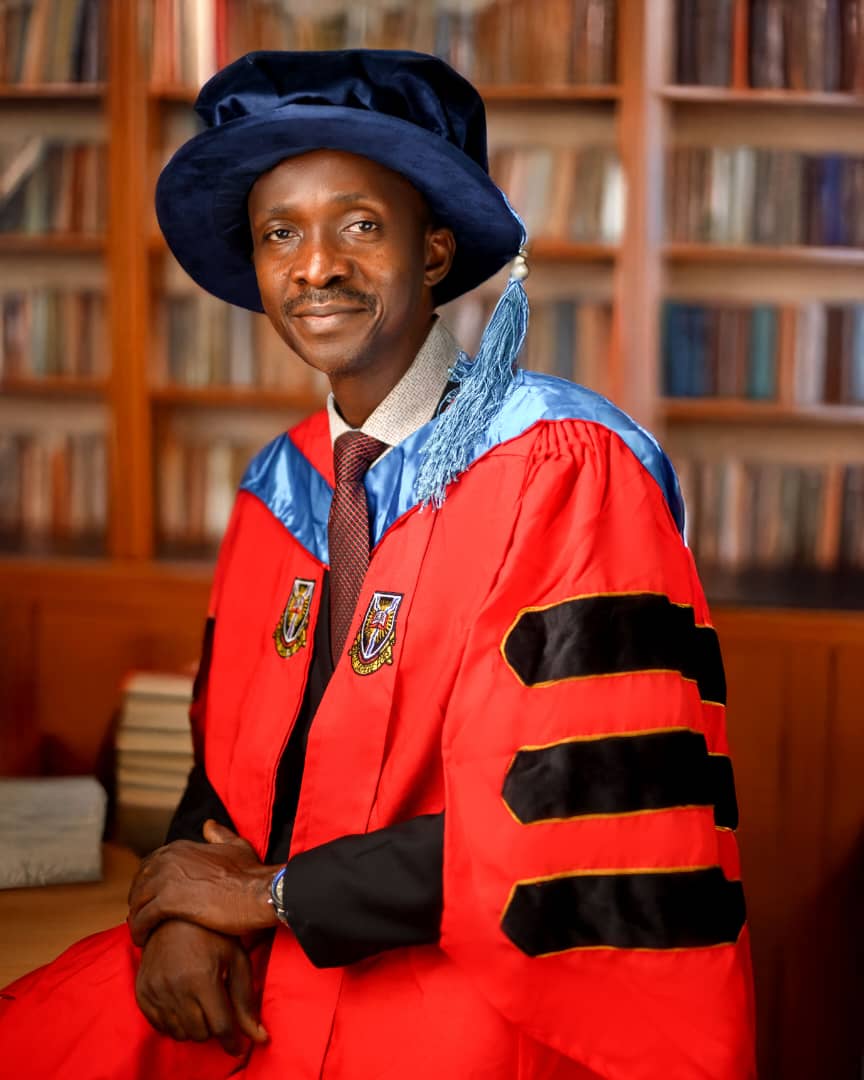 Professor Samuel Adetunji Onasanwo was born to the family of Prince Gabriel Idowu Onasanwo (of blessed memory) and Madam Margaret Jumoke Onasanwo over five decades ago at the University College Hospital, Ibadan, Nigeria.
Professor Samuel Adetunji Onasanwo was born to the family of Prince Gabriel Idowu Onasanwo (of blessed memory) and Madam Margaret Jumoke Onasanwo over five decades ago at the University College Hospital, Ibadan, Nigeria.
Young Samuel had his primary education at Christ the King Convent School, Agugu, Ibadan, Nigeria, between 1979 and 1984. He had his secondary school education at Lagelu Grammar School, Agugu, Ibadan, Nigeria, between 1985 and 1989, where he obtained his West African School Certificate (WASC).
Thereafter, he proceeded to the University of Ibadan and graduated in 1996 from the Department of Physiology, where he obtained a Bachelor of Science (Honours) degree in Physiology with Second Class Upper Division. As an undergraduate, he was the best graduating student in Physiology. He then proceeded for his compulsory National Youth Service in Rivers State, where he served at Government Secondary School, Eberi, Onuma, Port Harcourt, between 1997 and 1998.
Professor Samuel Onasanwo went on to obtain his M.Sc. (2000) and Ph.D. (2005) degrees in Physiology from the University of Ibadan. He began his academic career as an Assistant Lecturer in the Department of Physiology, University of Ibadan, on 29th June 2000, shortly after completing his Master’s degree. He rose steadily through the ranks of the University’s promotion ladder and became a Professor of Physiology on 1st October 2019.
Professor Onasanwo has served (and is still serving) the University in various capacities: Sub-Dean (Undergraduate) from 2006 to 2014, Postgraduate Coordinator for the Department of Physiology from 2014 to 2018, and Sub-Dean (Postgraduate) from 2018 to 2022. He is currently the Head, Department of Physiology, a position he has held since 2024.
Professor Onasanwo has served as an External Examiner to several institutions, including the University of Benin; Obafemi Awolowo University; Afe Babalola University; Edo State University; Olabisi Onabanjo University; Ondo Medical University; University of Ilorin; University of Lagos; and the University of KwaZulu-Natal in South Africa.
He is a member of several professional societies, including the Physiological Society of Nigeria (PSN), African Association of Physiological Sciences (AAPS), The Physiological Society UK, American Physiological Society (APS), Society for the Study of Pain (SSPN), International Association for the Study of Pain, Neuroscience Society of Nigeria (NSN), Society of Neuroscientists of Africa (SONA), and the International Brain Research Organization (IBRO). He has served as Financial Secretary and Treasurer of the Neuroscience Society of Nigeria (NSN), Treasurer of the Society of Neuroscientists of Africa (SONA), and Financial Secretary of the Physiological Society of Nigeria (PSN) to date.
As a scholar, Professor Onasanwo has successfully supervised six Ph.D. graduates in Physiology and Neuroscience, two M.Phil. students, many Master’s students, and numerous B.Sc. students. He is currently supervising three Ph.D. students. He has an H-index of 20 and has published over 71 articles in peer-reviewed journals, in addition to numerous conference proceedings and book chapters.
Professor Onasanwo has received numerous awards, including the Best Graduating Student Award in Physiology (1996). He received the prestigious Federal Government of Nigeria Postgraduate Scholarship Award in 2002. In 2004, he was awarded the Postgraduate Fellowship by the Council of Scientific and Industrial Research (CSIR) and the Third World Academy of Sciences (TWAS), which enabled him to carry out research at the Central Institute of Medicinal and Aromatic Plants, Lucknow, India. He also received the INSA-JRD TATA Fellowship Award at the Regional Research Laboratory, Jammu-Tawi, India, in 2006.
In 2008, Professor Onasanwo was awarded a post-doctoral CSIR/TWAS Fellowship at the Central Drug Research Institute, Lucknow, India. He obtained the Research Training Fellowship for Developing Country Scientists (RTFDCS) under the RTFDCS-CCSTDS (CICS) Fellowship and proceeded to the Central Drug Research Institute (CDRI), Lucknow, and the National Institute for Interdisciplinary Science and Technology (NIIST), Thiruvananthapuram, Kerala, India, in 2011. In 2014, he received the International Junior Research Grant (IJRG) for short-term post-doctoral training at the School of Applied Sciences, University of Huddersfield, West Yorkshire, United Kingdom.
He has served as an External Examiner to the University of Benin, Benin City; Obafemi Awolowo University, Ile-Ife; Afe Babalola University, Ado-Ekiti; Edo State University, Iyamho; Olabisi Onabanjo University, Ago-Iwoye; Ondo Medical University, Ondo; University of Ilorin, Ilorin; University of Lagos, Idi-Araba; and the University of KwaZulu-Natal, Durban, South Africa.
Professor Onasanwo is a Pastor at Christ Life Church International, Ibadan. He is married to Mrs Olasubomi Onasanwo, a banker and businesswoman. Their marriage is blessed with two children: Peter Adesoji and Deborah Adeola.
- 582ND INAUGURAL LECTURE TO BE DELIVERED BY PROFESSOR VICTOR I. AKINMOLADUN
- 581ST INAUGURAL LECTURE TO BE DELIVERED BY PROFESSOR KAYODE O. OSUNGBADE
- Celebrating the 9th Provost of CoMUI Prof. Olusegun Olusina Akinyinka @ 70
- VALEDICTORY PROGRAMME & LECTURE IN HONOR OF PROFESSOR ADERONKE OMOBONIKE AKINPELU


